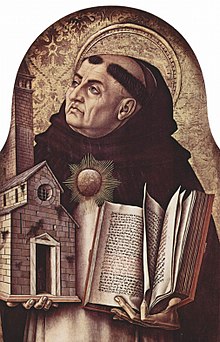Studiorum ducem
The encyclical Studiorum ducem by Pope Pius XI. is dedicated to the 600th anniversary of the canonization of Thomas Aquinas , it is dated June 29, 1923. The Pope wrote on the anniversary year of the canonization: “... it is desirable that all lecturers of higher subjects get there, the angelic teachers (Doctor angelicus) to love Thomas Aquinas through long and multiple occupation with his writings ... "
Philosophy and theology
In several sections, brief descriptions of life and explanations of the work follow, after which the Pope deals in detail with an assessment of the “virtue of prudence”, which Thomas particularly exemplified.
On the studies of philosophy and theology , Pius XI writes:
- “Of course we wish that among the worshipers of St. Thomas - and they are supposed to be all sons of the Church who are engaged in the best studies - give that honorable competition in just freedom from which scientific endeavors arise, but not jealousy that does not serve the truth. It should therefore be sacred to each of them what is prescribed in the Codex Iuris Canonici , namely that the professors study philosophy and theology and teach these subjects entirely according to the method, teaching and principles of the “angelic teacher “Should shape them and keep them holy; and everyone should align themselves with this norm so that they can truly call him their teacher. "
Pius XI refers to this topic. also to the encyclical Pascendi of September 8, 1907, in which Pius X defends the hierarchical order of the Church and the study of the Doctors of the Church , especially that of Thomas Aquinas. Pius XI. confirms the words of his predecessor: "To deviate from Thomas Aquinas in the metaphysics is to run into serious danger".
About his works
Everything that Thomas Aquinas wrote is based on the basis of the Holy Scriptures , he had chosen the words of God correctly and carefully and scientifically justified them. These values and guidelines created by him would also be recognized by Leo XIII. with his encyclical Providentissimus Deus and Benedict XV. sanctioned in his encyclical Spiritus Paraclitus .
Pius XI. further writes:
- "In addition, this Doctor of the Church had the great grace and the privileged gift of transforming God's commandments into liturgical prayers and hymns, and became the poet of the Divine Supper."
In the further text he then mentions the struggle against modernism and adds "that the modernists, with good reason, fear no other doctor of the church as much as St. Thomas Aquinas."
Honors

First of all, the Pope points out that his work had already found great recognition during the lifetime of Thomas Aquinas, for example with Pope Alexander IV (1254–1261), who called him a “beloved son” and called him “nobleman of the Of the letter and of divine and human learning ”.
Later Pope John XXII. (1316–1334) praised with the following words: “He alone enlightened the Church more than all other doctors” (note: Doctors of the Church) and in 1323 he was canonized. And finally, it was Pope Pius V was (1566-1572), who had raised this scholar in 1567 Doctor of the Church (Doctor Ecclesiae). He also refers to the orders of Leo XIII. (1878–1903), who with his encyclical Aeterni patris (1879) declared the teachings of Thomas Aquinas to be the official philosophy of the Church, he also referred to the Motu Proprio “Doctoris Angelici” by Pius X. (1903–1914), who called this scholar "angelic".
Benedict XV also followed the recommendations of his predecessors . (1914–1922) affiliated, he sanctioned "the system, the philosophy and the basic rule of the Heavenly Doctor of the Church".
Anniversary celebrations
The Pope orders that in all churches, seminaries , authorized teaching institutions from July 18, 1923 to the end of the following year, courses, seminars, but also instructions should take place, the preachers should turn to the saint and also should honor the saint to be prayed. For further liturgical performances he announces a complete indulgence and at the end of this encyclical introduces the prayer for St. Thomas Aquinas.
